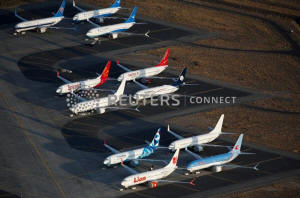FAA must ramp up staffing to oversee airplane certification after 737
MAX: panel
 Send a link to a friend
Send a link to a friend
 [October 12, 2019] By
David Shepardson [October 12, 2019] By
David Shepardson
WASHINGTON (Reuters) - The U.S. Federal
Aviation Administration had insufficient personnel to oversee the
certification of new Boeing airplanes and should make significant
reforms in how it approves new aircraft, an international aviation panel
said Friday.
The panel also faulted assumptions made by the airplane manufacturer in
designing the 737 MAX and for not disclosing more information to the
FAA.
Reuters reported on a draft copy of the Joint Authorities Technical
Review (JATR) findings and recommendations earlier on Friday that called
for sweeping changes in how the FAA evaluates and certifies new
airplanes.
Representative Peter DeFazio, a Democrat who chairs the House
Transportation Committee, said Friday, the report "raises new and
disturbing questions about the separation between regulator and
manufacturer." Democratic Senators Ed Markey and Richard Blumenthal said
the report confirms "our worst fears about a failed broken system of
aviation safety scrutiny."

JATR panel Chairman Christopher Hart, a former chair of the National
Transportation Safety Bord, told reporters on Friday he thinks the
aviation certification system is not broken but needs to be improved,
adding the review found "communication failures."
"There were a lot of good people trying to do the right thing in
sometimes difficult circumstances," Hart said, adding a key issue is
"how do we make sure everybody knows what they need to know."
The report also said the FAA did not closely evaluate a key safety
system known as MCAS involved in two fatal crashes of the MAX in five
months that killed 346 people and prompted the plane's grounding in
March.
FAA Administrator Steve Dickson said Friday the agency would respond to
all recommendations in the "unvarnished" review.
At issue is the long-standing practice of the FAA delegating
certification tasks to Boeing and other manufacturers. Many critics say
the FAA should take a bigger role.
The report said the FAA had just 45 people in an office overseeing
Boeing's Organization Designation Authority (ODA) and its 1,500
employees.
In the 737 MAX, the FAA initially delegated 40% of the certification
tasks and boosted that figure as the five-year review progressed,
including the review of MCAS. The panel said, "FAA involvement in the
certification of MCAS would likely have resulted in design changes that
would have improved safety."
[to top of second column] |

An aerial photo shows Boeing 737 MAX aircraft at Boeing facilities
at the Grant County International Airport in Moses Lake, Washington,
September 16, 2019. REUTERS/Lindsey Wasson/File Photo

Boeing is revising the 737 MAX software to require the MCAS system to receive
input from both Angle of Attack sensors, and has added additional safeguards. If
the AOA sensors differ by 5.5 degrees or more then MCAS cannot operate.
The FAA's office oveseeing Boeing has just 24 engineers and they face a wide
range of tasks to ensure compliance in overseeing Boeing's 737, 747, 767, 777,
and 787 programs.
The review added there are only two technical FAA staff assigned per Boeing
program and some are "new engineers with limited airworthiness experience."
The review also found "signs of undue pressure" on Boeing employees performing
tasks for the FAA, "which may be attributed to conflicting priorities and an
environment that does not support FAA requirements."
DeFazio said, "Undue pressure may have been placed on individuals at the FAA and
Boeing to get the MAX into service as quickly as possible."
The panel said the FAA should review delegation procedures "to remove undue
burdens and barriers between the Boeing (office) and the FAA and promote
cultural changes at both organizations."
Those Boeing employees should be able to directly talk to FAA technical staff
"without fear of reprisal," the review added.
Boeing did not respond to criticism in the report but said it is "committed to
working with the FAA in reviewing the recommendations and helping to
continuously improve the process and approach used to validate and certify
airplanes."
A U.S. Senate panel last month approved legislation to increase aviation safety
budgets by $31.8 million and require the FAA to finalize its rule-making on
safety management systems for aircraft manufacturers.
The aviation panel report also said the FAA must ensure manufacturers "provide a
full list of all aircraft proposed changes (no matter how trivial)."
The JATR, which was commissioned in April by the FAA, includes air safety
regulators from the United States, Canada, China, Indonesia, European Union,
Brazil, Australia, Singapore, United Arab Emirates and Japan, and the five-month
review included FAA officials who were not part of the 737 MAX certification.
Deputy FAA Administrator Dan Elwell told Congress in March the agency would need
an additional 10,000 employees that would cost $1.8 billion if it were to assume
all responsibilities for aircraft certification.
(Reporting by David Shepardson; Editing by Richard Chang, Nick Zieminski and
Cynthia Osterman)
[© 2019 Thomson Reuters. All rights
reserved.] Copyright 2019 Reuters. All rights reserved. This material may not be published,
broadcast, rewritten or redistributed.
Thompson Reuters is solely responsible for this content. |